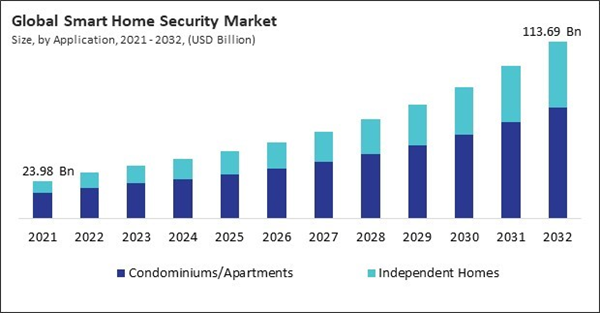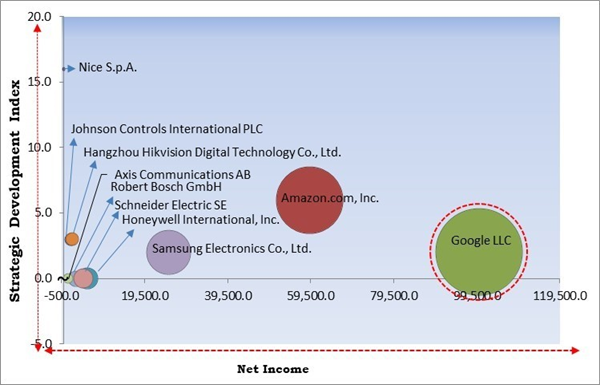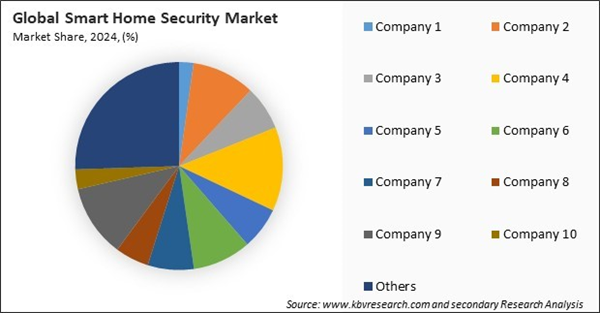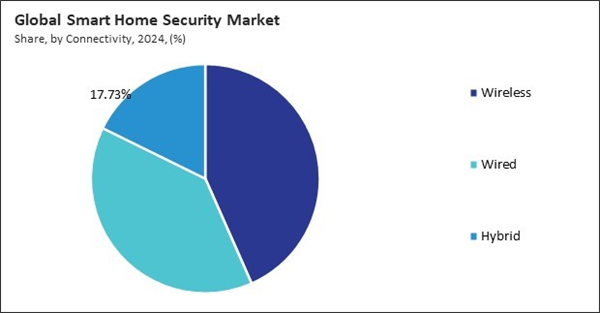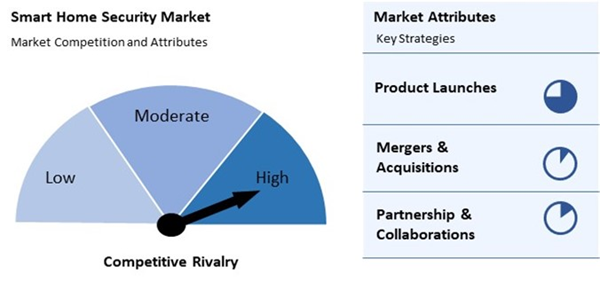Modern smart cameras offer features such as HD recording, night vision, motion detection, and cloud storage, making them a critical component of home security systems. The expanding use of these systems for outdoor and indoor monitoring has further boosted their adoption among homeowners seeking enhanced visibility and peace of mind. Thus, the smart camera & monitoring system segment held 34% revenue share in the market in 2024. The segment's expansion is driven by the increasing demand for continuous surveillance and the capacity to monitor residences using smartphones and connected devices remotely.
The major strategies followed by the market participants are Product Launch as the key developmental strategy to keep pace with the changing demands of end users. For instance, In October, 2024, Nice S.p.A. unveiled the Nice Video Doorbell, blending advanced security and sleek design. Integrated with the Nice Home Management platform, it offers smart automation, remote access, and seamless installation. Available in PoE/Wi-Fi and 2-wire models, it provides reliable, customizable home security with high-definition video and smart features. Additionally, In August, 2023, Hangzhou Hikvision Digital Technology Co., Ltd. unveiled its new Smart Managed Switches, enabling remote deployment and configuration of security systems via the Hik-Partner Pro app. These switches feature 6 KV surge protection and integrate with cameras, alarms, and access control devices, offering simplified, efficient management and troubleshooting from any location.
Cardinal Matrix - Market Competition Analysis
Based on the Analysis presented in the Cardinal matrix; Google LLC is the forerunner in the Smart Home Security Market. Companies such as Amazon.com, Inc., Samsung Electronics Co., Ltd., and Honeywell International, Inc. are some of the key innovators in Smart Home Security Market. In February, 2025, Amazon.com, Inc. unveiled Alexa+, a premium version of its voice assistant, offering advanced AI features for seamless smart home control. Priced at $19.99 per month (free for Prime members), Alexa+ enables voice-activated automations, enhanced home management, and integration with devices like Ring cameras, providing a more intuitive smart home experience.Market Growth Factors
The growing awareness of the importance of home safety among consumers has significantly influenced the increase in demand for smart home security solutions. People are increasingly concerned about the risks of burglary, package theft, and unauthorized access - especially in urban and suburban areas with high population density. This has led to a noticeable shift from traditional security measures to more advanced, real-time solutions that offer greater peace of mind and immediate response capabilities. In summary, the market is anticipated to experience substantial growth as this awareness reaches a global scale, particularly in developing regions.Additionally, the expanding adoption of smart devices and home automation platforms has naturally paved the way for integrating smart home security systems. With more consumers installing smart speakers, thermostats, and lighting systems, transitioning to security devices that work seamlessly within these networks becomes a logical next step. Interconnected ecosystems enable centralized control, allowing users to monitor and secure their homes with a simple voice command or a mobile app. Thus, as the ecosystem of smart home devices becomes more robust and accessible, it will continue to drive momentum for smart home security adoption.
Market Restraining Factors
One significant restraint in the market is the high upfront cost of devices and installation, which can be a major deterrent for budget-conscious consumers. Purchasing a full suite of smart security equipment - such as smart cameras, motion sensors, digital locks, and control panels - can be expensive, particularly when bundled with subscription-based monitoring services. This cost barrier prevents widespread adoption, especially in lower-income households and emerging markets. As a result, cost concerns slow adoption rates and create scepticism toward the overall return on investment, especially in price-sensitive regions.The leading players in the market are competing with diverse innovative offerings to remain competitive in the market. The above illustration shows the percentage of revenue shared by some of the leading companies in the market. The leading players of the market are adopting various strategies in order to cater demand coming from the different industries. The key developmental strategies in the market are Product Launches and Product Expansions.
Driving and Restraining Factors
Drivers
- Rising Consumer Awareness About Home Safety and Security Solutions
- Growing Adoption of Smart Devices and Home Automation Systems
- Increasing Disposable Income and Rising Number of Dual-Income Households Globally
Restraints
- High Initial Cost and Affordability Concerns for Budget-Conscious Consumers
- Vulnerability to Cyberattacks and Hacking, Threatening System Integrity
Opportunities
- Increased Internet Penetration and Smartphone Usage Across Emerging Markets
- Rising Urbanization and Smart City Initiatives by Governments Globally
Challenges
- Risk of Device Obsolescence Due to Rapid Technological Advancements
- Complexity in Installation and Integration of Multi-Device Systems
Application Outlook
Based on application, the market is segmented into independent homes and condominiums/apartments. The independent homes segment procured 34% revenue share in the market in 2024. This dominance is primarily attributable to the growing number of householders utilizing smart security solutions to provide more comprehensive protection for their independent properties.Connectivity Outlook
By connectivity, the market is divided into wireless, wired, and hybrid. The wireless segment witnessed 43% revenue share in the market in 2024. This can be attributed to the growing consumer preference for security systems that are both flexible and simple to install and do not necessitate professional installation or extensive wiring. Wireless technologies such as Wi-Fi, Zigbee, and Z-Wave enable seamless connectivity between devices like smart cameras, motion detectors, and alarms.Component Outlook
Based on component, the market is characterized into hardware, software, and services. The software segment procured 40% revenue share in the market in 2024. Software solutions enable users to manage devices remotely, receive alerts, and integrate various components into cohesive security systems through mobile apps and cloud platforms.Device Type Outlook
On the basis of device type, the market is classified into smart alarms, smart locks, smart sensors & detectors, smart camera & monitoring system, and other. The smart locks segment recorded 23% revenue share in the market in 2024. The increasing focus on convenience, access control, and remote management of home entry points has propelled the demand for smart locks. These devices offer features such as keyless entry, biometric authentication, and app-based locking/unlocking, which enhance both security and user experience.Market Competition and Attributes
The Smart Home Security Market is highly competitive, driven by innovations in surveillance cameras, smart locks, and integrated systems. Key players like Amazon Ring, Google Nest, and ADT focus on enhancing user experience through AI-powered monitoring and seamless device integration. Attributes such as reliability, ease of use, and scalability are critical in attracting consumers. With increasing concerns about privacy and data security, companies are also investing in robust encryption and secure cloud solutions to differentiate themselves in this rapidly expanding market segment.
Regional Outlook
Region-wise, the market is analyzed across North America, Europe, Asia Pacific, and LAMEA. The Europe segment witnessed 29% revenue share in the market in 2024. The region's expansion is facilitated by the government's initiatives to promote smart infrastructure, the increasing emphasis on energy efficiency, and expanded urbanization. Consumers across countries like Germany, the UK, France, and the Netherlands are increasingly adopting integrated home security systems to enhance both convenience and protection.Recent Strategies Deployed in the Market
- Apr-2025: Samsung Electronics Co., Ltd. announced the partnership with Arlo, a Security systems services company, integrating AI-powered features into smart home security. The update introduces two-way audio, live event snapshots, and object detection powered by Arlo’s computer vision. This enhances real-time monitoring and contextual alerts, improving security and streamlining the smart home experience.
- Apr-2025: Google LLC teamed up with Ayla Networks, is a leading provider of an advanced cloud-based platform to enhance its smart home connectivity solutions. This collaboration leverages Google Cloud’s infrastructure to offer scalability, reliability, security, and advanced AI capabilities, enabling smart home manufacturers and retailers to efficiently deploy and manage products, ensuring high performance, uptime, and customer satisfaction.
- Feb-2025: Amazon.com, Inc. unveiled Alexa+, a premium version of its voice assistant, offering advanced AI features for seamless smart home control. Priced at $19.99 per month (free for Prime members), Alexa+ enables voice-activated automations, enhanced home management, and integration with devices like Ring cameras, providing a more intuitive smart home experience.
- Oct-2024: Nice S.p.A. unveiled the Nice Video Doorbell, blending advanced security and sleek design. Integrated with the Nice Home Management platform, it offers smart automation, remote access, and seamless installation. Available in PoE/Wi-Fi and 2-wire models, it provides reliable, customizable home security with high-definition video and smart features.
- Jul-2024: Amazon.com, Inc. unveiled a revamped Echo Spot smart alarm clock. It features an improved display, better audio with a front-firing speaker, and customizable design options in six colors. The device integrates with Alexa, offering smart home controls, alarms, and routines.
- Apr-2024: Nice S.p.A. unveiled the E+ Extended Range Sensors by 2GIG®, enhancing residential and commercial security. These innovative indoor and outdoor sensors offer long-range, weather-resistant, and pet-immune features, along with glass break, motion, smoke, and heat detection - ensuring smarter, more secure environments with easy installation and extended battery life.
- Apr-2024: Nice S.p.A. unveiled the Linear 661 Garage Door Opener and the Nice G.O. mobile app, offering smart garage control with remote access, real-time alerts, and scheduling features. With Wi-Fi/Bluetooth connectivity, eco-friendly design, and integrated battery backup, it ensures easy installation and enhanced convenience for both users and dealers.
List of Key Companies Profiled
- Nice S.p.A.
- Honeywell International, Inc.
- Johnson Controls International PLC
- Amazon.com, Inc
- Robert Bosch GmbH
- Hangzhou Hikvision Digital Technology Co., Ltd.
- Samsung Electronics Co., Ltd. (Samsung Group)
- Schneider Electric SE
- Google LLC (Alphabet Inc.)
- Axis Communications AB (Canon, Inc.)
Market Report Segmentation
By Application
- Condominiums/Apartments
- Independent Homes
By Connectivity
- Wireless
- Wired
- Hybrid
By Component
- Hardware
- Software
- Services
By Device Type
- Smart Camera & Monitoring System
- Smart Locks
- Smart Sensors & Detectors
- Smart Alarms
- Other Device Type
By Geography
- North America
- US
- Canada
- Mexico
- Rest of North America
- Europe
- Germany
- UK
- France
- Russia
- Spain
- Italy
- Rest of Europe
- Asia Pacific
- China
- Japan
- India
- South Korea
- Singapore
- Malaysia
- Rest of Asia Pacific
- LAMEA
- Brazil
- Argentina
- UAE
- Saudi Arabia
- South Africa
- Nigeria
- Rest of LAMEA
Table of Contents
Companies Mentioned
- Nice S.p.A.
- Honeywell International, Inc.
- Johnson Controls International PLC
- Amazon.com, Inc.
- Robert Bosch GmbH
- Hangzhou Hikvision Digital Technology Co., Ltd.
- Samsung Electronics Co., Ltd. (Samsung Group)
- Schneider Electric SE
- Google LLC (Alphabet Inc.)
- Axis Communications AB (Canon, Inc.)



